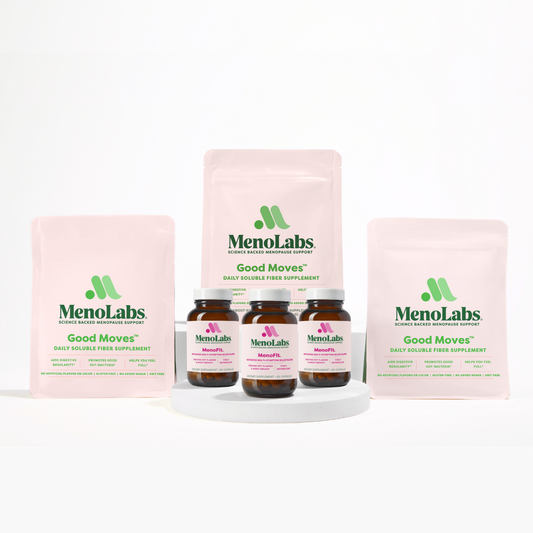
- Beauty
- Sleep
Music Prescription: How music can help with your anxiety during peri/menopause and post-menopause
Our culture loves music. We love to celebrate our artists at award shows like the Grammys. But have you ever considered how music can help you through the anxiety you...
1 min read
Our culture loves music. We love to celebrate our artists at award shows like the Grammys. But have you ever considered how music can help you through the anxiety you might be feeling with peri/menopause to post-menopause?
Music can help you through the hard times.
The North American Menopause Society shared a study that stated up to 23% of perimenopausal and postmenopausal women experience mood changes. These changes can be due to a variety of factors from the drop in estrogen levels to life changes like parents passing away and children moving out. No studies have been able to pinpoint exactly what affects women's shift in mood during this time, but it can be significant in some women. If you experience anxiety for more than two weeks, it might be depression and you should meet with a doctor to discuss treatment options.
A study in Turkey found that music can soothe women during post-menopause who are experiencing anxiety. The study broke women into two groups for a six-week period. They asked each woman about the symptoms they were experiencing in a survey to begin the study. One group had to listen to music for at least 18 sessions for 15 minutes each in a quiet space. The other group didn’t have to. After the six-week period, the participants came back and completed the survey again. The women who listened to music had lower levels of symptoms than they had originally shared.
Music Therapy has been around for a long time.
The Ancient Greeks believed that music had healing power. The Pythagoreans had a daily routine of music therapy. They listened to music to help them go to sleep and then when they woke up, they started the day with music to help them start their day. The Pythagoreans associated music with “good temperament” so developed a music prescription to ensure their days ran smoothly.
How does music help?
Music helps the brain release good chemicals that make you feel relaxed and happy. Medical News Today highlights that “Music has powerful effects on the mind. Different styles of music can have a significant effect on a person’s mood very quickly, and it can help them experience and process a wide range of emotions, from happiness to excitement, as well as sadness, calmness, and thoughtfulness.” It’s best for this practice to be alone, in a quiet place. Allowing you to have some quality time alone to think and reflect.
The North American Medical Society shares that music is therapeutic because, “it stimulates the secretion of certain neurotransmitters, including dopamine, serotonin, and endorphins and the hormone oxytocin while decreasing the level of circulating stress hormones such as cortisol. These substances play a role in blood pressure, as well as heart and respiratory rates.” For women in midlife, this can be very helpful since the drop in estrogen levels during peri/menopause can affect blood pressure significantly. Eating a nutritious diet, working out, and adding music therapy can be the combination your body needs to stay healthy.
-improved self-esteem
-decreased anxiety
-increased motivation
-successful and safe emotional release
-stronger connections with other people
What types of music help?
The women in the study listened to Turkish classical music. The American Music Therapy Association states that “All styles of music have the potential to be useful in effecting change in a client’s or patient’s life. The individual’s preferences, circumstances and need for treatment, and the goals established will help the trained music therapist determine what music to use.” If you are trying this at home, turn on your favorite tunes and enjoy! See where this experience takes you!
The Practice:
The music prescription should be done on a regular basis. Apps like Calm offer music therapy to make the process easier. But, it can be any music that brings you joy and calm. Studies also show that learning to play a musical instrument can be beneficial for anxiety. If you aren’t ready to try this on your own and would like more direction you can find a music therapist in your area through The American Music Therapy Association.
Keep in mind that music therapy can definitely be helpful if you are experiencing anxiety. But, if you are experiencing depression you will need to talk to a doctor about other options.
Related Products
Blend Besties Bundle
Fresh Start Bundle
4.7 / 5.0
(553) 553 total reviews











